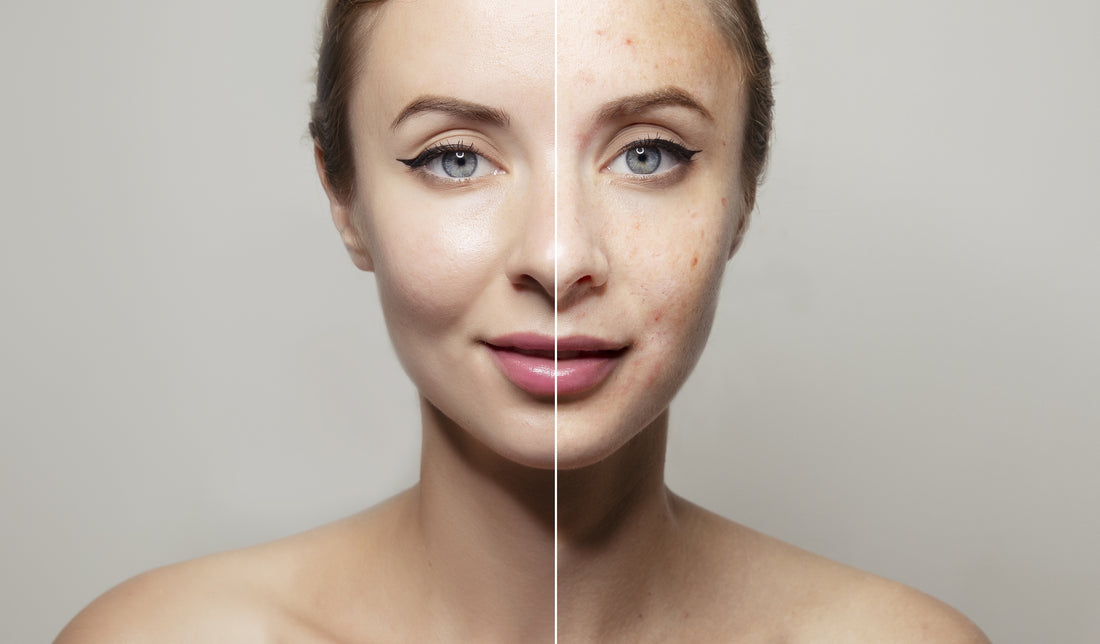
Different skin types: How to determine your skin type and why it is important to know it
Your skin type is determined by genetics. However, the condition of your skin can also change during different periods of your life due to internal or external factors. For instance, during adolescence skin tends to be more oily, while older skin is usually dry. Another example is menstruation or pregnancy, where the skin is often prone to impurities and skin problems. Physical or mental illnesses, medications, and hormonal imbalances are other factors that can affect the condition of the skin. But also more banal reasons like the different seasons or weather influences have an impact on our skin.
There are five basic types of healthy skin: normal, dry, oily, combination, and sensitive skin.
Why it is important to know your skin type
It is important to understand what type of skin you have as each skin type has different needs and thus requires a different skincare regimen. If you do not choose the right product according to your skin type, it will not be as effective or - even worse - could cause skin conditions. Therefore, knowing your skin type is essential before purchasing any kind of skincare product.
Characteristics of the different skin types
The normal skin type is neither too dry nor too oily. It has very few imperfections because it is not prone to blemishes, breakouts, flakiness, greasy patches, or tightness. It has a smooth texture and a good elasticity. It is less likely to be prone to sensitivity.
Dry skin has insufficient oil content in the upper layers of the skin (=epidermis). It typically looks dull and may be rough, scaly, or flaky. It often feels tight and less elastic and may be prone to showing more visible lines. In addition, dry skin may become itchy.
Side note: It is important to differentiate between dry skin and dehydrated skin. Dehydrated skin lacks water, whereas dry skin lacks oil. Dehydrated skin is a temporary skin condition, while dry skin is caused by genetics, hormones, or medicine.
Oily skin produces an excessive amount of sebum that causes the skin to appear shiny and feel greasy, especially throughout the T-Zone (forehead, nose, and chin). Oily skin often has enlarged pores, uneven texture, blemishes, or breakouts. It is more likely to develop acne.
Combination skin includes areas on the skin that are dry, while other areas of the face are oily. Typically, the skin on the T-Zone is more oily, and the skin on the cheeks is either dry or normal.
Sensitive skin is often referred to as a skin type of its own, but you can have oily and sensitive skin, dry and sensitive skin, or normal and sensitive skin. Commonly, people with dry skin tend to have more sensitive skin. If you have sensitive skin, you typically experience a lot of redness and itchiness. It may also be prone to burning or stinging. These symptoms are generally caused by overreactions to certain ingredients or environmental factors. Sensitive skin may also be caused by over-scrubbing or over-exfoliating your skin.
How to determine your skin type
If you are still unsure what skin type you have, there are simple ways to determine it.
One way to find out is to simply observe your skin after cleansing. After you have washed your face with a gentle cleanser, pat it dry and then wait for 30 to 60 minutes.
To find out whether your skin is oily or not, take a tissue or a blotting sheet. Press it onto various areas of your face and then hold the sheet up to the light to see if it has absorbed any oil from your face. If the sheet has soaked up a large amount of oil from all over your face, you have oily skin. If the sheet has only picked up oil from your T-Zone, you have combination skin.
If the sheet did not pick up any oil at all, your skin is either normal or dry. If your skin feels tight after washing it and is flaky or scaly, you most likely have dry skin. If it is red and itchy, your skin is also sensitive. If you do not notice any of these symptoms, you likely have normal skin.
Knowing your skin type is crucial for creating a skincare routine that works. Tomorrowlabs routine finder helps you to find suitable skincare products for your skin type. Click here, to try it!
To keep up with the latest news on skin health and Tomorrowlabs product innovations, check out our Instagram @tomorrowlabs.eu